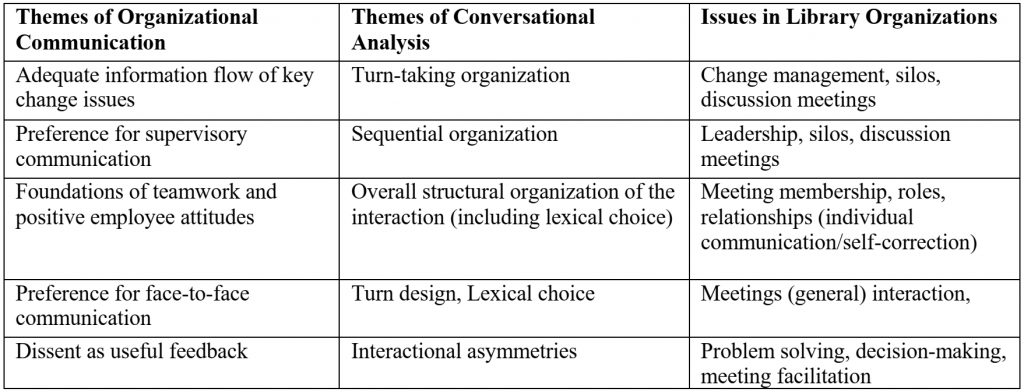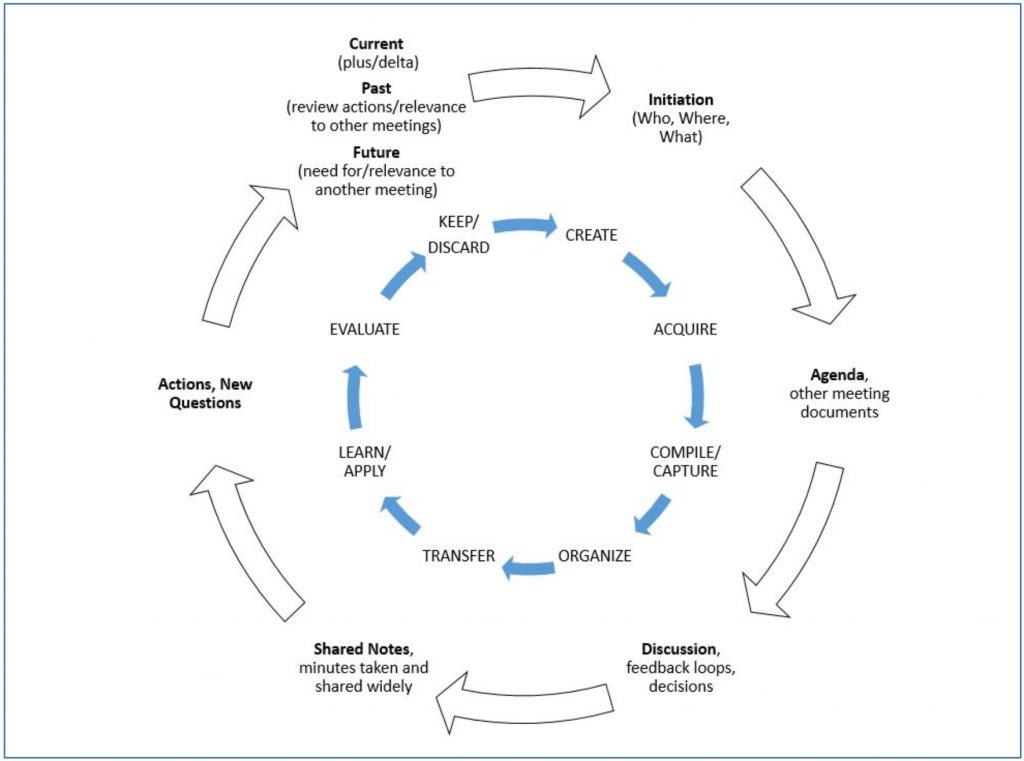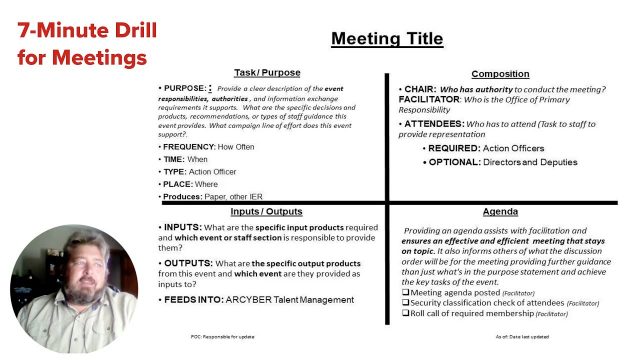
How effective are meetings for organisational knowledge management, and how can they be improved?
A sizeable proportion of the work time of people in organisations is taken up by meetings, as they are seen to have a beneficial role in the identification, creation, sharing, and use of both tacit and explicit knowledge. Demonstrating their perceived value, the use of meetings persists despite advances is information and communications technology that were supposed to make them largely redundant.
However, given the large amount of staff time devoted to them, meetings are very expensive. So how can the effectiveness of meetings as a knowledge management tool be assessed? And how can they be made more effective?
These questions are explored in a new paper1 from Angela Rathmel, Associate Librarian at The University of Kansas.
Rathmel’s research uses theoretical frameworks to connect organizational knowledge management to good practices in meeting effectiveness in academic library contexts, and then from this draws conclusions about potential strategies to improve effectiveness. The findings are also potentially relevant to other contexts, and this could be the subject of further research.
Rathmel uses two theoretical frameworks as the basis for her analysis, being organizational communication and conversational analysis:
- The organizational communication (OC) framework is structural and leadership-driven (macro level). The OC literature links knowledge management to communication of information, perceiving a process composed of messages, inputs, transmissions, and outputs. In this message-centered approach, leadership or power structures within organizations drive and shape the organizational communication and managed knowledge.
- The conversational analysis (CA) framework is representational, interactive, and more communicatively-centered (micro level). The CA literature studies meetings as collaborative actions, rather than as a product of individual actors within organizations. The sociological nature of interaction is regarded as being too complex a phenomenon to address through OC frames, with those frames seen as underestimating the power of talk to create reciprocal and self-organizing systems. CA is characterized by the analysis of turn-taking initiation and duration, topic organization (e.g. agendas), and facilitation of multimodal meetings practices (e.g. space, text, images, and actions). CA aims to understand the interactive participation that ultimately contributes to making sense of the topics that are the focus of the meeting.
Five common themes arise from consideration of the OC framework, and Figure 1 shows these themes mapped to both the related CA themes and the organizational communication issues most commonly experienced in libraries. Viewed side by side, the relationship between meetings and these themes suggest how ineffective meeting practices may negatively impact organizational knowledge.

Meeting effectiveness strategies
From Rathmel’s analysis, the following findings in regard to improving the effectiveness of meetings as a knowledge management tool emerged.
Critical strategies:
- Most effective strategies. The two most effective meeting strategies were found to be using agendas and fostering mutual involvement in discussion.
- Agendas and timeframes. The use of agendas was found to be effective regardless of size or length of the meeting, and especially when timeframes are designed to ensure the successful completion of agenda items.
- Mutual involvement. Strategies like balancing or soliciting meeting participant involvement in discussion also proved a standard, effective practice across meeting sizes. However, meeting size and length did influence whether participant involvement occurs, so as meeting size increases, greater attention to strategies for mutual involvement is important.
- Facilitation skills. These findings suggest that organizations would benefit from training meeting participants in facilitation skills, regardless of whether meetings designate a single facilitator role.
Other important strategies:
- Punctuality. Starting and ending meetings on time is important, to avoid wasting participants valuable time.
- Feedback loops. The majority of organizations determine meeting participation based on hierarchy rather than on needs, which suggests the importance of incorporating feedback loops before, during, and after meetings.
- Hierarchies and silos. An over-reliance on meetings that are created (or otherwise function) through hierarchical constructs perpetuates a silo mentality.
- Flexible structures. The flexibility of the structures associated with a meeting can act to either facilitate or stifle opportunities for feedback loops. These structures include the agenda content, the order of the agenda items, the meeting roles (chair, facilitator, expertise, power), and the hierarchical divisions in the organization.
Moving forward:
- Foundation knowledge. A first step towards more effective meeting practice is for the members of organizations to gain a better understanding of the relationship between meetings and the knowledge management cycle, as shown in Figure 2.
- Master meeting calendar. Organizations can prepare a master calendar of meetings, which will help to reduce meeting load fatigue and therefore improve meeting effectiveness. The calendar can facilitate consideration of the meeting loads of individuals and groups, and allow for meetings to be more reliably convened on particular days each week or month, and at certain times of the day.
- Resources for meeting effectiveness assessments. Having a dedicated knowledge manager, organizational development department, or staff resources to support effective assessments could help those interested in applying OC and CA approaches to be able to do this.
- Resources for further research. Greater investment in research into meeting effectiveness is needed.

Reference:
- Rathmel, A. (2019). To Meet or Not to Meet: Questioning the Effectiveness of Meetings for Organizational Knowledge Management. Author Revised Manuscript incorporating editorial review for unpublished chapter in Jennifer A. Bartlett and Spencer Acadia (eds). Libraries that Learn: Keys to Managing Organizational Knowledge, to be published Spring 2019 in ALA editions. ↩
Also published on Medium.



